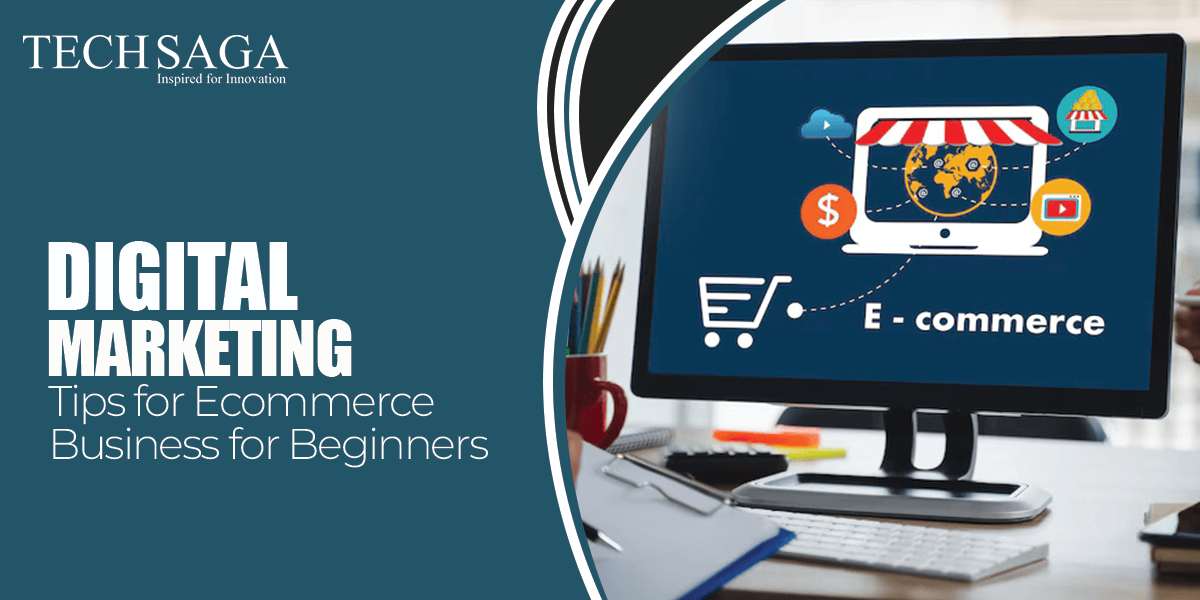Team Techsaga
Gain valuable insights and stay updated with the latest innovations through our engaging blog. Explore trends, technology advancements, and expert opinions to navigate the ever-evolving world of IT.
Digital Marketing Tips for Ecommerce Business for Beginners
In a time when digital marketing thrives in every company, if you are running a startup or an e-commerce business, it is essential to understand e-commerce marketing concepts for smoother operations. Digital marketing refers to all activities conducted online to promote a brand, product, or service. Understanding this marketing is crucial for store owners, as it directly relates to their success in the digital marketplace.
To stand out, beginners must develop a strong e-commerce marketing strategy that leverages digital marketing to attract, convert, and retain customers.
For beginner e-commerce businesses, a focused approach to digital marketing can yield significant results. Prioritize SEO, build a strong online presence through content marketing, and use email marketing for customer engagement and retention. Additionally, consider leveraging social media and influencer marketing to reach a broader audience and increase sales.
This blog will walk you through essential digital marketing tips specifically for beginners in the e-commerce business, covering the types of e-commerce marketing, proven strategies, and how to get started the right way.
Why E-commerce and Digital Marketing Go Hand in Hand
Before diving into the strategies, it’s important to understand why e-commerce and digital marketing are inseparable. Digital marketing refers to any marketing effort that uses the internet or electronic devices. It includes channels like social media, email, search engines, and more.
Since an ecommerce business operates online, it naturally depends on digital marketing to drive traffic, build brand awareness, and generate sales. Whether you’re selling handmade crafts or running a large-scale dropshipping operation, embracing e-commerce marketing is critical to success.
Define Your E-commerce Marketing Strategy
Every successful online store starts with a well-thought-out marketing strategy. This includes:
-
Identifying your target audience:
Who are your ideal customers? Understand their demographics, interests, and online behaviors.
-
Setting clear goals:
Are you trying to increase brand awareness, generate more sales, or boost customer retention?
-
Choosing your marketing channels:
Depending on your audience, choose the most effective digital marketing platforms, such as Google Ads, Facebook, Instagram, or email marketing.
-
Budgeting and timelines:
Allocate your marketing spend wisely and create a timeline to execute campaigns.
Without a solid e-commerce marketing strategy, it’s easy to waste time and money on tactics that don’t yield results.
Top Digital Marketing Tips for Beginners
Here are some actionable digital marketing tips to help beginner entrepreneurs grow their e-commerce business:
1. Optimize Your Website for Conversions
Your website is your storefront. Make sure it’s fast, mobile-friendly, and user-friendly. A clean layout, easy navigation, and clear calls to action (CTAs) can significantly increase conversions. Use tools like heatmaps and A/B testing to learn how users interact with your site.
2. Leverage SEO for Organic Traffic
Search Engine Optimization (SEO) is a long-term strategy that helps your products show up in Google searches. Optimize product descriptions, meta tags, and images. Use keyword research tools to identify terms your customers are searching for and incorporate them naturally throughout your content.
3. Start Content Marketing
Content marketing is one of the most effective types of e-commerce marketing. Blogging, how-to guides, and product tutorials not only help with SEO but also build trust with your audience. Consider writing articles that answer common questions or solve problems related to your niche.
4. Use Email Marketing to Nurture Leads
Email is a direct and personal channel for communication. Set up automated email campaigns for cart abandonment, new product launches, and customer re-engagement. Offering discounts or exclusive content can help you maintain loyal customers.
5. Harness the Power of Social Media
Social media platforms are ideal for brand exposure and engagement. Instagram and TikTok are especially useful for visually driven products. Use influencer marketing, live videos, and shoppable posts to drive traffic to your store.
6. Run Paid Ads Wisely
Paid ads on Google or social media can quickly generate traffic, but they must be targeted and monitored closely. Start with a small budget and test different ad creatives and copy. Retargeting ads are particularly effective in converting visitors who didn’t buy the first time.
7. Encourage Reviews and User-Generated Content
Social proof is powerful. Encourage satisfied customers to leave reviews or share photos using your product. This builds credibility and influences new buyers. By prompting customers to share their experiences, opinions, and photos, businesses can create authentic content that resonates with potential buyers
Understanding the Types of E-commerce Marketing
To create a diverse and effective e-commerce marketing strategy, it’s crucial to understand the various types of e-commerce marketing available:
- Search Engine Marketing (SEM) – Paid ads to appear in search engine results.
- Social Media Marketing – Organic or paid promotions on platforms like Facebook, Instagram, and Pinterest.
- Email Marketing – Directly reaching customers through their inboxes with tailored messages.
- Affiliate Marketing – Working with influencers or affiliates who promote your products for a commission.
- Content Marketing – Creating useful and engaging content to attract and retain customers.
- Influencer Marketing – Partnering with individuals who have large followings to promote your products.
Diversifying your efforts across several types of e-commerce marketing can help you reach more potential customers and build a robust brand presence.
Monitor, Analyze, and Improve
Here’s a breakdown in clear bullet points:
- Track Performance Metrics: Regularly monitor key performance indicators (KPIs) such as traffic, engagement, conversions, and customer feedback.
- Use Analytics Tools: Utilize tools like Google Analytics, social media insights, and CRM platforms to gather and interpret data.
- Identify Trends and Patterns: Look for recurring behaviors or trends to understand what’s working and what needs adjustment.
- Gather Customer Feedback: Collect input through surveys, reviews, or direct communication to gain valuable insights.
- Benchmark Against Goals: Compare current performance to your set objectives to evaluate progress.
- Test and Optimize: Implement A/B testing, experiment with new strategies, and refine underperforming areas.
- Stay Updated: Keep up with industry trends and competitor activity to remain competitive and innovative.
- Make Data-Driven Decisions: Use the insights gathered to inform strategic decisions and continuously improve outcomes.
Conclusion
In conclusion, recognize that the role of e-commerce and digital marketing in business success is to help you find customers in the right place, at the right time, with the right offer. Embrace various types of e-commerce marketing, stay consistent, and always adapt based on performance metrics. By blending creativity with data-driven decision-making, you can build a compelling brand and sustainably grow your online store.
Unfortunately, without a well-planned strategy, your chances of success are quite limited since competition is fierce and technologies can be intimidating and time-consuming.
At Techsaga, we focus on empowering e-commerce businesses to thrive in the digital age. Whether you’re just starting or looking to scale, our expert team provides tailored e-commerce marketing solutions, cutting-edge technology, and growth-focused strategies. From website development to complete digital marketing services, Techsaga empowers brands to unlock their full potential online. Get in touch with us today and elevate your e-commerce business to the next level.
TAG: E-commerce Marketing


